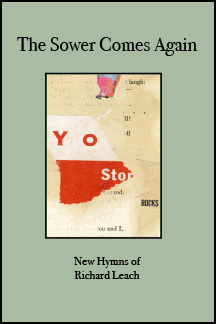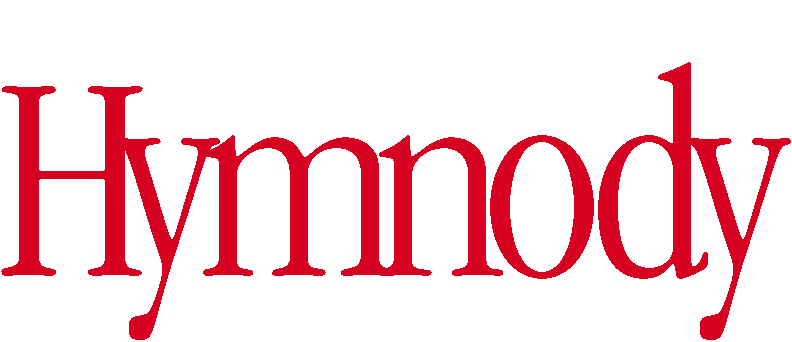|
Author Richard Leach
Released 7/16
Catalog no. 125-430
Price $16 (U.S.) |
Order now!
|
Description
Richard Leach's texts are well worth singing, and many composers feel the same way, setting his hymn texts to music. Here are 36 texts, new and older, with settings by
- James Clemens
- Andrew Donaldson
- Alfred V. Fedak
- Amanda Husberg
- Iteke Prins
- William P. Rowan
- Margaret Tucker
- David Ashley White
They cover many topics and scripture passages, and the collection includes complete topical and lectionary indexes for planning purposes. (Download indexes here)
Introduction by Richard Leach
"O sing to the Lord a new song." That is the first verse of Psalms 96 and 98. Other psalms also say it, and so does Isaiah chapter 40, verse 10. All of us who write new words and music for people to sing in worship take that verse as permission, as our license to write and offer our work to the church.
Our God is surely worthy of the talents of living poets and composers, and their songs are new by definition. But recently written is a not a very deep definition of newness. One could improvise new words and music to God on the spot, but they might not be worth repeating!
I suggest that the Psalmist wants a new song not for the sake of novelty, but for the sake of the new things God does. New things like leading slaves into freedom and keeping a very old promise to give them a land. New things like forgiveness rather than making debtors pay and pay and pay. New things like touching those the world has declared untouchable and healing those the world thinks are not healable. New things like the resurrection of a Jewish rabbi who had been rejected by the leaders of his own people, and legally executed by the Roman empire as a threat to its order.
The world has many old songs sung by old singers. Pharaoh's Hebrew slaves in Egypt knew what they sounded like. We remember Pharaoh. When you go to him asking for a break from work in order to worship God, he tells you that you're just being lazy.
The old song and the old singers say that God cannot be our first priority. They say that when it's time to make the bricks, you make the bricks. When the straw for the bricks is taken away and the brick quota gets raised, you do without straw and you meet the new quota. And somehow, no matter how many quotas you meet, no matter how long and hard you work, the work is never done.
"Whistle while you work," says Pharaoh. You know the tune, you know the words. Sing my song. Do as I say.
But the God of Israel does not answer to Pharaoh. God does something Pharaoh does not expect, something new. God frees the slaves from Egypt, and Pharaoh's pursuing army drowns behind them, its heavy cavalry stuck in the mud, as Israel goes on in sandals and barefoot to freedom. Miriam begins the new song on the freedom shore. "Sing to the Lord, for he has triumphed gloriously. The horse and his rider he has thrown into the sea."
The song of escape from the imperial troops chasing us down is always new. Miriam's song never gets old. Sing that, says the Psalmist. You don't have to sing Pharaoh's old song any more.
This is a challenge as well as a promise because besides being the heavy yoke of a work song, the old song may be a stirring anthem sung before a ball game or as a flag is saluted--so big and colorful and emotional, who wants to be left out, who dares not to salute? And the old song is a song of fear, alternately shrieking angrily and purring seductively, telling us that if we will learn the tune of not stepping out of line, of giving up civil liberties, of casting a suspicious eye on the designated other, the empire will make us secure while striking down our enemies. The chariots and troops got bogged down in the mud that one time--now the empire claims to know all about mud.
But in the end the old song is a narrow song matched to a narrow life. It is the new song sung by Miriam, the new song called for by the psalmist that gives us room--room to breathe and to move, room to live and to love.
Songs of the seas into which the imperial horses and riders go down are the new song. The laments and cries in bondage that caught the ear of God when the Israelites were slaves are the new song, for sometimes the new song is a complaint and the old song is "Don’t complain or I'll give you something to complain about." Songs of our God-given freedom are the new song, whether they were written yesterday or three millennia ago.
Jesus tells a parable about a farmer who for some reason scatters seed everywhere--on the path, on rocky ground, and among thorns. The old song is, "Those seeds aren’t going to amount to a thing." But the new song is, "Oh, but they did and they do and they will."
Richard Leach
Stamford, Connecticut
Palm/Passion Sunday, 2016 |
|

"Richard Leach's faith imagination is a gift to all who cherish congregational singing. This slim volume is going to get a lot of wear and tear in my collection of songbooks."
--The Hymn

Review
"Richard Leach delights in creativity. A retired UCC pastor, he’s a jazz enthusiast and poet of both secular and sacred verse. While service churches in Connecticut, he explored scripture beyond what fit neatly into a sermon. His creative impulses led him to play with imagery, meter, and rhyme.
Now, three decades later, he's a leading writer of words for hymns with a dozen collections. His texts are set as anthems and included in a number of hymnals and supplements.
The refrain of his 'Song for the Sower,' in two settings, gives this collection its title. Here is the familiar parable about our generous God, who flings seeds with abandon. The seeds are named like the candles of an Advent wreath--peace, love, joy, and hope. God's relentless optimism is reinforced by repetition: 'And the sower goes, the sower goes, and the sower comes again.'
In his elegant introduction, Leach defines old songs as those belonging to Pharaoh--songs of fear, greed, anger, and empire. New songs are like the one Miriam sang on freedom's shore. Leach writes, 'The old song is "Those seeds aren't going to amount to a thing." But the new song is, "Oh, but they did and they do and they will." '
The first half of this collection offers images of God, Jesus, Mary, and the Roman centurion who pleaded for his servant's healing. There are hymns about communion, the Trinity, creation, diversity-loving rainbows, 'blue-robed earth,' oceans, stars, and 'tiny seas of tears.' Only a few texts are rendered unusable in my congregation and in others by exclusive, patriarchal terminology.
In the second half of this songbook, the texts offer fresh interpretations of the Psalms, with occasional references to Jesus woven in.
The eleven composers represented here provide a range of musical styles. 'Yes, I almost lost my footing,' about our temptation to envy the proud, rich, and cruel, is enhanced by Amanda Husberg's contemplative setting. 'More of you,' a brief prayer chant, is transformed into a projound statement of intention by James Clemens's vigorous jazz setting.
The songs are arranged to avoid page turns while accompanying. Six helpful indexes are included at the end.
Richard Leach's faith imagination is a gift to all who cherish congregational singing. This slim volume is going to get a lot of wear and tear in my collection of songbooks." --Pam McAllister in The Hymn, Autumn 2019
|



